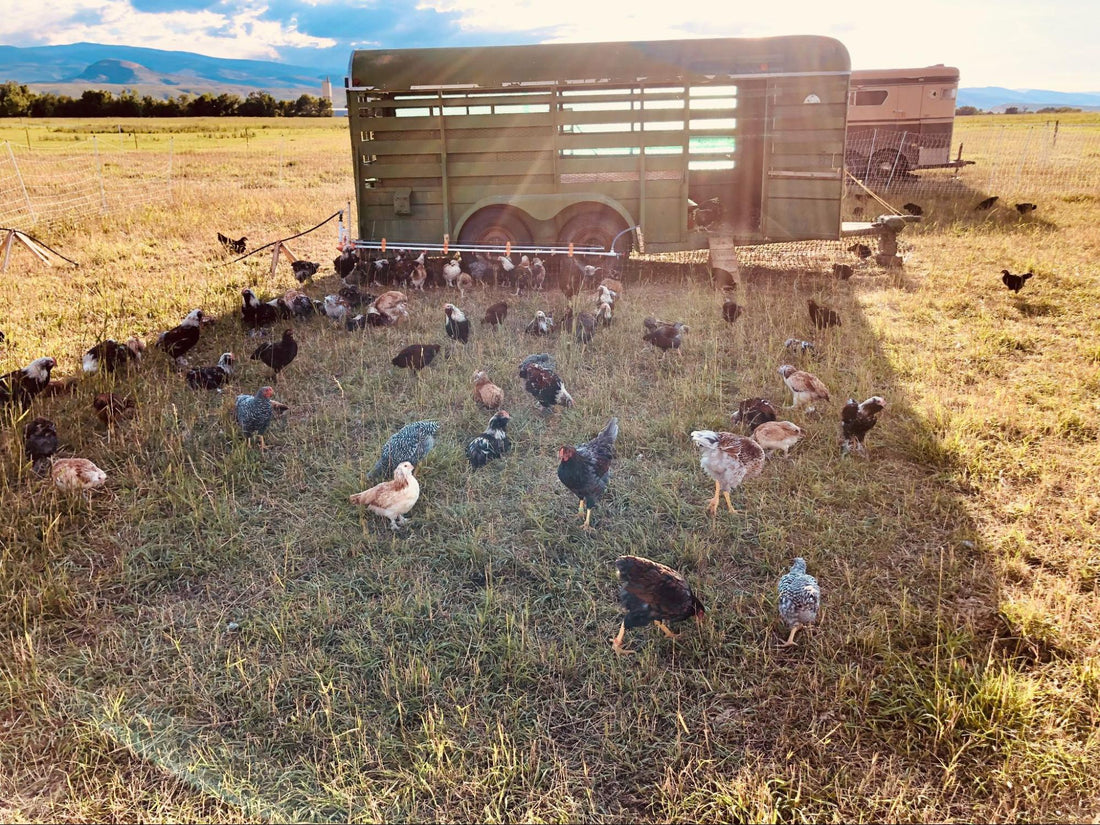
How to Keep Chickens Cool in a Heatwave
Share
It is crucial to ensure your feathered friends stay cool and comfortable. Heat waves can be hazardous for chickens, leading to heat stress, dehydration, and even death.
When temperatures soar, your flock faces unique challenges. Chickens are sensitive to extreme heat because they cannot sweat to cool themselves. If you're wondering how to keep chickens cool in the summer, you're in the right place.
Let's walk through effective ways to keep chickens cool to stay healthy and productive even in sweltering temperatures.
Why Do Chickens Struggle in the Heat?
Chickens don't sweat like humans, making it harder to cool off naturally. When temperatures rise over 85°F (29°C), chickens start to show signs of heat stress. From panting to spreading their wings, they rely on external cooling methods to avoid dangerous heat exhaustion. Prolonged exposure to heat without relief can lead to:
- Reduced egg production
- Weaker immunity
- Fatal heat stroke in extreme cases
7 Tips for Keeping Chickens Cool in a Heatwave

Ensuring your flock's well-being by keeping chickens cool in a heatwave is essential. Here is how you can help them beat the heat:
1. Provide Plenty of Fresh, Cool Water
One of the simplest ways to keep chickens cool is to ensure they have constant access to fresh, cool water. Place waterers in shaded areas to keep the water temperature down, and consider adding ice cubes on extremely hot days. Offering shallow water bowls where chickens can dip their beaks or stand in the water is also helpful.
2. Create Shade and Ventilation in the Coop
A coop in direct sunlight can turn into an oven, especially during peak summer hours. Provide your chickens with shade and airflow by allowing them to go under a mobile coop, or installing shade cloths or tarps to block out the sun. Additionally, ensure that the coop is well-ventilated. Open windows and add fans if necessary to circulate air, which can significantly reduce inside temperatures.
3. Offer Cooling Treats
Cold snacks are a great way to keep chickens cool while treating them. Freeze fruits like watermelon, berries, or cucumbers and offer them as refreshing summer snacks to your flock. These treats help cool them down and keep them hydrated with water-rich foods.
4. Use Misters for Evaporative Cooling
If temperatures are extreme, setting up a mister around the coop can create a cooling mist effect. Place the mister at a low setting so chickens can walk under or around it without feeling overwhelmed. This method is safe, effective, and widely used in poultry farms to maintain comfortable conditions for chickens in the summer.
5. Avoid Overcrowding the Coop
During the summer, chickens will try to spread out to keep their bodies cool. To avoid overcrowding, make sure they have enough space to do so. Too many birds in one space increase heat levels and can quickly lead to stress, so keep a close eye on space availability during the hottest months.
6. Dust Baths in Shaded Areas
Dust baths help chickens naturally clean themselves and regulate their body temperatures. Position dust baths in shaded areas and keep the soil slightly damp, if possible, as the cooling effect will help chickens stay comfortable while they dust bathe.
7. Encourage Roaming During Cooler Times
Chickens tend to be more active in the morning and evening when temperatures are cooler. Allowing them to forage during these times allows them to explore without facing extreme midday heat. Limiting their activity to these periods will also reduce stress and help maintain their energy.
Recognizing Symptoms of Heat Stress

Even with these strategies in place, monitoring your flock for symptoms of heat stress is essential. Key indicators include:
- Panting with beaks open
- Reduced egg production
- Soft, thin-shelled eggs
- Smaller eggs
- Diarrhea
- Drooping wings and labored breathing
- Slower growth
- Lethargy and lack of interest in food or water
- Poor nutrient absorption and malnutrition
- Suppressed immune response
- Delayed recovery from illness
If you notice these signs, move the chickens to a cooler spot, offer extra water, and consider using direct fans or misters to provide immediate relief.
Understanding the Risks of Heat Stress
Understanding the risks of heat stress in chickens is also as important. When temperatures soar, chickens can struggle to regulate their body temperature. This can lead to several health problems, such as:
- Reduced egg production: Heat stress can significantly decrease egg production.
- Poor egg quality: Eggs may become smaller, weaker, or have thinner shells.
- Respiratory issues: Chickens may experience difficulty breathing, leading to respiratory issues or infections.
- Dehydration: Heat can cause chickens to lose fluids rapidly, leading to dehydration.
- Heatstroke: In severe cases, heat stress can lead to heatstroke, which can be fatal.
Frequently Asked Questions

Can I spray water directly on my chickens to cool them down?
Yes, but be cautious. Spraying water directly can be helpful, but only lightly mist them. Avoid drenching the chickens, as wet feathers can lead to discomfort.
How can I cool off chickens in extreme heat?
Provide shade, plenty of cool water and frozen treats, and use misters or fans. In shaded areas, create dust baths to help them regulate their body temperature.
What temperature is too hot for chickens?
Temperatures above 85°F (29°C) can stress chickens, while anything over 95°F (35°C) is potentially dangerous and can lead to heatstroke.
How much shade does my coop need during a heatwave?
Aim for around 60–70% shade coverage to ensure sufficient cooling while allowing some sunlight for balanced ventilation.
Can I add electrolytes to their water?
Electrolytes help chickens retain hydration during extreme heat. Check with a poultry vet or specialist for the best options for your flock.
Will cold treats upset my chickens' digestive system?
Not at all! Fruits like watermelon or cucumbers are gentle on chickens' digestive systems and help hydrate them, making them perfect for hot days.
Are certain breeds more heat-tolerant than others?
Yes, some breeds handle heat better, but most chickens still require the same cooling efforts, as prolonged exposure to high temperatures can impact any breed.
Stay Prepared with Melissahof
At Melissahof, we understand the importance of caring for heritage breeds and sustainable poultry flocks, especially in challenging conditions. Knowing how to keep your chickens cool in the summer and during a heatwave is vital for their health and productivity.
So, don't wait until the thermometer spikes to implement these strategies. Prepare your coop, monitor the weather, and take proactive steps to safeguard your flock.
Using a combination of natural cooling methods, plenty of shade, and hydration practices, your chickens can thrive even in the hottest months. The next time you face a heatwave, rest assured that these simple steps will keep your flock happy, healthy, and safe.
Need advice on sustainable poultry care? Melissahof is here to help. We offer a range of purebred heritage breeds, including hatching eggs and starter pullets. You can also find our seed garlic and culinary garlic available nationwide, with live poultry, chicken meat, and garlic products available exclusively within Wyoming—delivered to your doorstep or ready for farm pickup.
Want to learn more about chicken care? Check out our blog for veteran advice and tips.

